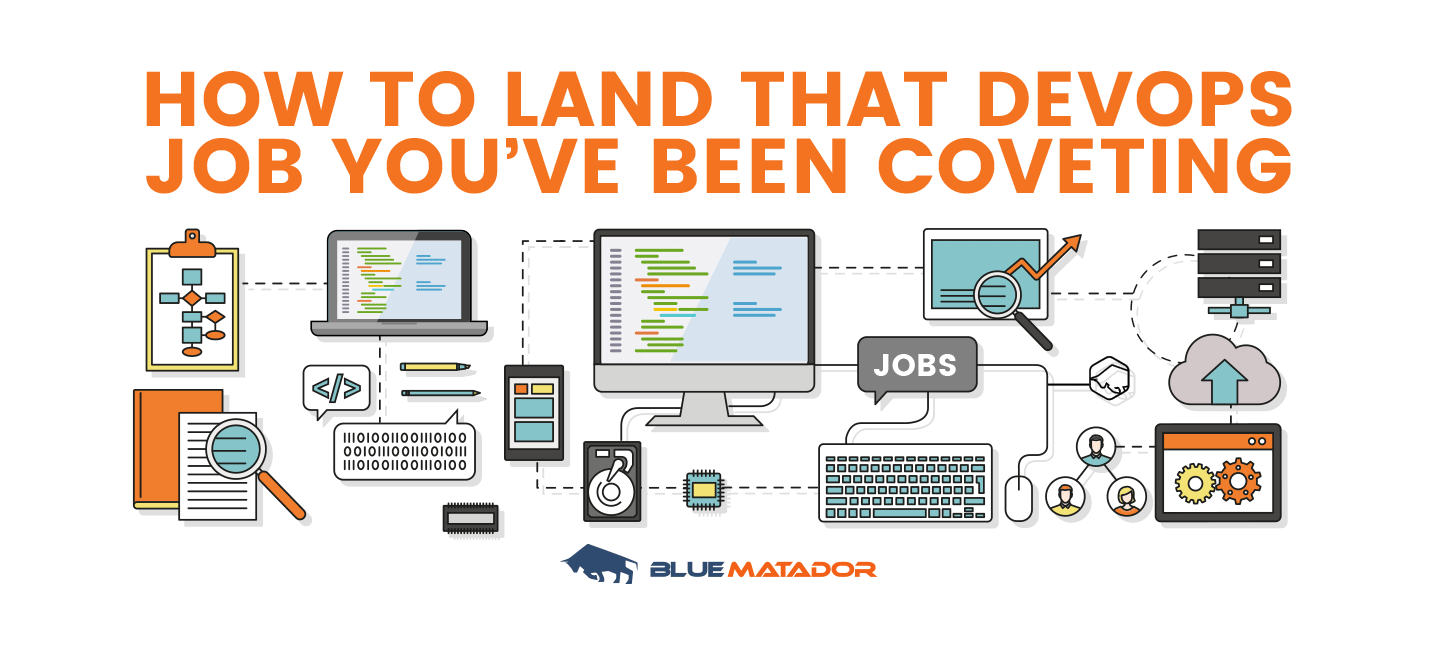If you’ve started a career in development or operations, or if you’ve got an IT background and want to make a switch, transitioning to a cushy but intellectually rewarding DevOps job at your dream company may not be as difficult as it seems.
Let’s start with job stats. According to the U.S. Bureau of Labor Statistics (colloquially known as the BLS), DevOps doesn’t fit neatly into their Standard Occupational Classification (SOC) list. But you can interpolate DevOps job growth by looking across three other fields: database administrators, network and computer systems administrators, and computer network architects. Each of these classifications has excellent expected job growth. For instance, database administrators will increase at an above-average rate of 11% over the next 7 years, upticking from 120,000 jobs in 2014 to 133,400 by 2020.
This is good news for you if you’re wanting to break into the field (or advance your career if you’re already in DevOps), but it also means more competition.
Searching for DevOps Jobs
So where do you start looking? Searching online is a good place to start to get the lay of the land in current DevOps job openings. At the time of this writing, searching on LinkedIn Jobs yielded the most results for “devops”: a whopping 17,813 results in the U.S. alone. LinkedIn is known for its robust job application platform that makes it easy for potential employees to essentially apply with the click of a button, having all the required fields populated from a user’s LinkedIn profile. (Ergo, if you don’t have a stellar LinkedIn profile, now is the time to update it. More on that below.)
DevOps Jobs on Indeed
Indeed is another major contender for DevOps job listings. Even though other employment search sites like Monster.com have been around for longer, Indeed has made a name for itself with quality postings and becoming a top-of-mind place to start a job search. As of today, Indeed offers 13,990 DevOps positions. You can expect some higher-quality job posts for DevOps-related positions on Indeed.
DevOps Jobs on Glassdoor
Glassdoor, with its real benefit of offering salary data for specific companies and roles, is another excellent place to start searching. A search there will yield a staggering 30,000+ DevOps jobs, which leads to the question of quantity vs. quality.
Quality DevOps Jobs on Dice.com & Reddit
Dice.com has been around the longest of the above jobsearch sites. It started as a tech-focused job listing bulletin board service in the early ‘90s. Dice.com offers a total of around 80,000 jobs, but because they are laser-focused on IT, the 3,125 jobs (at the time of writing) offered there can be some of the best leads in a DevOps jobsearch. The difference here is that employers post to Dice.com specifically looking for well-qualified tech candidates. On other jobsearch sites, the candidate pool is more broad, meaning the job leads can be less applicable.
Lastly, if you’re looking for ultra-targeted job listings, don’t forget to check out the /r/devopsjobs subbreddit on Reddit.
Networking Your Way to a New DevOps Career
The best jobs aren’t found on job search sites. As you’ve probably heard before, the “hidden job market” found through networking is a better bet for higher-quality roles — and potentially better-paying salaries in them.
Here’s the rub, which you’ve probably already guessed: Developers and operations folks aren’t the most social people around. That’s not a bad thing; it’s just that they like Dungeons and Dragons more than networking.
If networking (the in-person kind, not the packet-switching kind) isn’t your thing, there are several other options for tapping into the elusive hidden job market where all the coveted positions are.
First, LinkedIn can be your best networking asset for landing that first aws network monitoring DevOps position. As mentioned above, you’re probably already on LinkedIn. But if you’re not, now is the time to create and start populating your profile with your relevant job experience, skills, education, applicable certifications, and programming languages you know.
Step 1: Improving Your LinkedIn Profile for DevOps
You’ll need to have a thoroughly fleshed out profile to become a strong candidate on LinkedIn and to regularly appear in job recruiters’ targeted searches.
Here’s some suggestions for populating your profile with relevant, important resume information:
DevOps Certifications for Job Searching
There is nearly an unlimited number of IT certifications to acquire in your career, but some are more important than others for DevOps. A few of these include:
- AWS SysOps Certification
- AWS DevOps Certification
- Microsoft Azure Certification
- Google Cloud Certification
- Docker Enterprise Certification [Update: This is a brand new certification]
- Chef Certification
- Puppet Certification
Languages for DevOps Jobs
Knowing a few programming languages is obviously important for DevOps practitioners. Here’s an article on Dzone that ranks some of the most important languages to know in DevOps.
A few include:
- Perl/PHP
- SQL
- C# (especially important for Windows server setups)
- Java
- Scala
- Python
However, if you want our recommendations, focus on Ruby. Both Chef and Puppet were built on Ruby. If you want to know one language, it should be Ruby. We also think Bash (on Linux) or PowerShell (on Windows) are essentials as well.
Key Skills for DevOps
Make sure you list your skills in not only the Featured Skills & Endorsements section of your profile (so others can upvote you on particular skills) but also in your job descriptions themselves. Important skills include:
- Terminal proficiency (bash, posix, etc.)
- Machine virtualization
- Containerization
- Scripting
- Source control (read: Git)
- Orchestration
- Deployment
- Continuous integration/continuous development
- Security practices
Best of luck!




